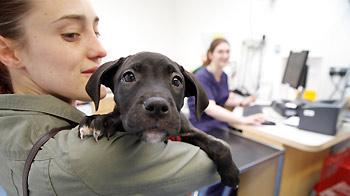Legal basis for processing - RSPCA
Legal basis for processing
The law requires us to only process personal data where we have a valid legal basis for doing so. We only process your information in accordance with the law.
What are the legal grounds for processing personal data?
There are six different legal grounds for processing personal data (plus additional conditions where sensitive personal data is used). The legal basis that we rely on for processing your data will depend upon the circumstances in which that data is being collected and used, but will in most cases fall into one of the following categories:
- where you have provided your consent to allow us to use your information in a certain way - for example using your image to publicise an event, forwarding your details to one of our branches, or sending you fundraising communications by email or, text;
- where the processing is necessary for the performance of a contract with you - for example, we will need to process your name, address and other details in order to rehome an animal to you, provide veterinary services or consider an application to work or volunteer with us;
- where the processing is necessary in order for us to comply with a legal obligation - for example, providing information to HMRC for tax purposes or to police forces for the prevention or detection of crime; or;
- where it is in our legitimate interests to process your data and our use of that information does not unfairly impact on your rights and freedoms - for example, communicating with you in line with your interests as a supporter by post or phone (including fundraising, unless you opt out), and carrying out research and analysis on the demographics, interests and behaviour of our supporters or those with an affinity with animal welfare to better understand your interests and motivations, based on postcode areas.
- where the processing is necessary in order to protect someone's life - for example, where we are investigating an animal welfare complaint and an individual connected with the incident raises concerns that we feel should be communicated with the police in order to protect individuals.
- where the processing is required in order to carry out a task that is in the public interest - for example, this legal basis is relevant to our investigation and prosecutions work, where we are seeking to enforce animal welfare legislation.
Where we process sensitive personal data, the RSPCA will only do so in accordance with one of the additional lawful conditions for processing that type of data. For example, when we have your explicit consent.
What are the RSPCA's legitimate interests?
Personal data may be legally collected and used if it is necessary for a legitimate interest of the organisation using the data, as long as its use is fair and does not adversely impact the rights of the individual concerned.
When we use your personal information, we will always consider if it is fair and balanced to do so and if it is within your reasonable expectations. We will balance your rights and our legitimate interests to ensure that we use your personal information in ways that are not unduly intrusive or unfair.
Our main interest in this context is to prevent cruelty to animals by raising both awareness of our vital animal welfare work, and funds to support it continuing. Examples of the RSPCA's using personal data for its legitimate interests include:
Providing animal welfare services for the benefit of the public
Admitting an animal into our care and/or recording a potential release site, checking and amending microchip details, logging incidents in our database at the National Call Centre, responding to concerns about an animal, updating witnesses of case outcomes and 'Home for Life' placements.
Communicating and interacting with our supporters and members of the public
Making supporters aware of our vital work caring for animals and the need for funds to support it, renewals of membership-based services, dealing with complaints, maintaining communication suppressions, facilitating awards based ceremonies, logging calls to our National Call Centre received from the general public relating to potential incidents and checking (and where necessary, updating) the microchip details for animals that have come into our care, sending you campaign emails and inviting you to events.
Undertaking research and analysis in order to better understand and communicate with our supporter base and to reach new supporters
Market research, surveys and data analysis in order to understand more about some of our current supporters.
Administering and governing the charity
Seeking professional advice and retaining data for historical, scientific or statistical purposes.
Managing our operations
Receiving information about job applicants and those applying for volunteer positions and administering supporters' estates and/or gifts in Wills where the RSPCA has been named as beneficiary or executor.
Undertaking research on current and prospective supporters
In order to understand our supporters better, we may undertake processing activities, including analysis, segmentation and prospect research, using publicly available sources and data tools, to customise the supporter experience. This may involve creating profiles of our individual supporters and we may sometimes use third parties to capture some of our data on our behalf. You can read more about making our work more unique to you.



